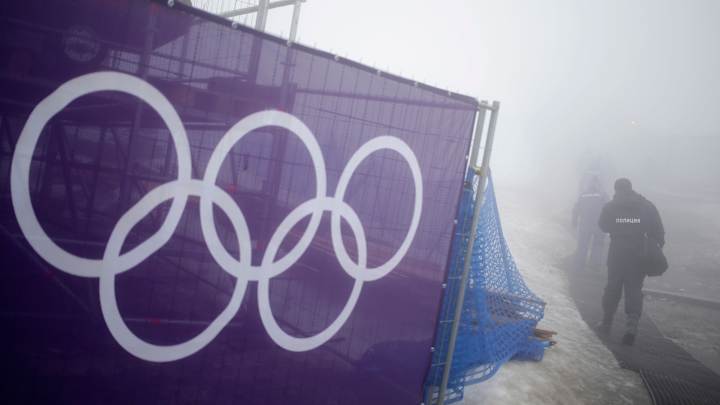In Sochi, Olympic security increasingly uneven

SOCHI, Russia (AP) Hotel guests are walking, unchecked, past unused metal detectors. Security guards are no longer poking around at the pockets and ankles of every single person entering Olympic facilities. Tangerines and bottles of Coke are making it through security barriers that banned them two weeks ago.
For all the warnings that security in Sochi would be invasive and aggressive, it's appearing more and more uneven, and in places almost relaxed.
No attacks have been reported since the Olympics started Feb. 7, and the world's attention has turned to skiing and skating instead of security measures. Organizers insist security overall remains remains tight.
But risks remain. Just a few hundred kilometers (miles) away, a long-running insurgency goes on, and Islamic militants stage regular attacks elsewhere in the Caucasus Mountains range hosting Olympic ski races. Russia has deployed tens of thousands of forces across the Sochi region and U.S. authorities sent two warships to the Black Sea.
Here are some things learned about security across the Olympic landscape from various spot checks conducted by - and the daily working experiences of - nearly two dozen Associated Press journalists as the first 10 days of the Sochi Games unfolded:
---
SLIPPING PAST SECURITY
Ahead of the games, guards at security stations around Olympic Park and in the nearby mountains carefully checked every bag, car and body. Some visitors with food were forced to eat it before passing through the gates.
In recent days, however, visitors have made it through metal detectors with coins, keys, watches, belts and credit cards. The metal detector at one well-visited hotel on the Sochi shore doesn't appear to be used at all - and when a visitor offered to have her bag checked, she was waved past.
Some guards - it seems more stringent in mountain venues than by the coast - are still inspecting every item, down to the smallest lip balm or a Valentine's Day balloon, scanned for explosives. But others have let through backpacks containing a pocketknife, water bottles, fruit and shampoo.
At some checkpoints, officers stop buses to scan beneath them with special long mirrors for explosives. Those checks have become irregular.
Officials at the Sochi organizing committee, asked Monday afternoon about specific inconsistencies, said they are not responsible for security and referred questions to Russian authorities.
Sometimes security measures are designed to be inconsistent, so that potential evildoers can't figure out the system. But the attitude of the ubiquitous guards seems increasingly laid back - some are flipping through their phones or listening to music while manning their posts - instead of calculated to thwart enemies.
One Sochi Games security feature never wavers, however, no matter the location: Olympic personnel, media members and even spectators themselves are all required to have special passes that are scanned upon arrival and departure from Olympic sites. That way, security teams can ensure that no one stays behind at any venue.
---
REASON TO WORRY?
The only incident so far has been a Ukrainian man's unsuccessful effort to hijack a Turkish plane the night of the opening ceremony.
But the underlying danger that worried athletes and spectators before the games remains.
Weeks before the Olympics, suicide bombers killed 34 people in two bombings in the city of Volgograd. An insurgency has been simmering across the Caucasus Mountains region for two decades. Chechen rebel leader Doku Umarov called on followers to attack the games.
Security experts warn that attackers could choose soft targets away from the Olympic sites such as shopping centers. Some have raised the possibility that jihadists could have infiltrated Sochi long before security was tightened.
---
TRACKING TROUBLEMAKERS
Russian security services wouldn't comment on lax security measures. But a string of arrests shows that they're keeping an eye on those who might disrupt events or want to call attention to abuses by Russian authorities.
An Italian gay-rights activist, Russian environmental activists and members of the Circassian ethnic group native to the Sochi region have all been detained in recent weeks.
Sochi organizing committee spokeswoman Alexandra Kosterina has shrugged off questions about inconsistent or confusing security measures. ''We ensure and our authorities ensure that Sochi is secure,'' she said. ''It is not an issue for us.''
International Olympic Committee president Thomas Bach suggests security measures at Olympic venues themselves are less invasive because authorities sealed off the larger region so tightly.
''The parameters of security are far from the main venues,'' he told the AP last week. ''The security forces are acting in an extremely friendly way so the Olympic atmosphere is not harmed at all.''
---
Associated Press reporters by the Black Sea coast in Sochi, on the mountain in Krasnaya Polyana and around the world contributed to this report. Follow Angela Charlton on Twitter at http://www.twitter.com/acharlton
